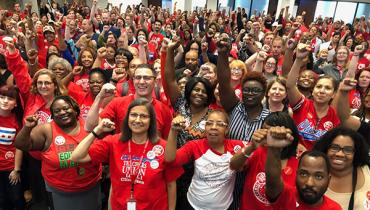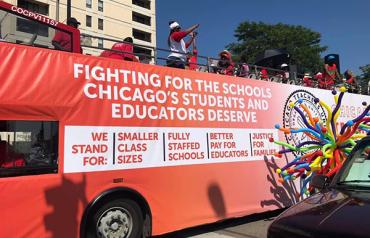The Chicago Teachers Union is ready to go on strike. Unless the district does a better job addressing the pressing needs of Chicago’s public school students, teachers could be walking the picket lines as early as Sept. 25.
Like their colleagues across the nation, these educators are standing up and fighting for better conditions in their public schools—specifically, smaller class sizes and more school nurses, social workers, school psychologists, counselors and other critical frontline staff. They need more teachers and paraprofessionals and better services for students—especially students of color—who face high levels of trauma. “If we don’t make more progress,” says CTU President Jesse Sharkey, “This is a union that is prepared to strike.
“I want the board to make good on its promises,” says Sharkey, referring to Mayor Lori Lightfoot’s promise to include some of these services in the city budget. “The funding has got to be in the budget, and they’ve got to put it in a contract.”
Thus far, the promise has not been fulfilled. The budget, approved by the mayor-appointed school board Aug. 28, actually provides less for schools than it did last year. It cuts at least $100,000 from each of more than 200 schools, and at least $500,000 from more than 40 schools.
The official budget also cuts the number of social workers by three and the number of certified school nurses and librarians by more than 12 percent; however, after CTU’s strenuous pushback, the board revised its quarterly position files, increasing budgeted—but unfilled—positions for social workers and health workers. CTU will continue to press for more positions and insist that the hundreds of vacancies in these jobs, existing slots as well as newly established ones, be filled.
CTU is also pressing the city to raise revenue from those who have reaped all of the benefits of Chicago’s new economy, by declaring a $400 million Tax Increment Financing surplus (known as TIF) and distributing half of it to Chicago Public Schools (CPS), and declaring a $100 million corporate head tax.
As far as putting improvements into the CTU contract, negotiations are ongoing. Lightfoot, who was elected in April and campaigned on an education platform that mirrored the CTU’s educational justice demands, has indicated that her budget promises are enough, and that class size and staffing are not contract issues. CTU disagrees, insisting that vital student services be written into an enforceable labor contract.
The city gives real estate developers, cleaning companies and food service companies “promises” in the form of written contracts, says Sharkey. “The mayor said the city is going to be turning over a new leaf. Start by making good on your promises to students to provide services and have good neighborhood schools. Put it in a contract that’s enforceable.”
“[If you say] I’m going to provide nurses but I refuse to put it in writing as a commitment that will be consistent, tangible and precise, we have a problem,” says Jackson Potter, a high school teacher and CTU activist. “That’s not a commitment; that’s a lot of hot air.”
The school board has proposed a contract with a 16 percent teacher raise over five years. But that proposal fails to improve the salary floor for low-wage teacher assistants and other paraprofessionals— two-thirds of whom earn wages so low their children are eligible for free or reduced-price school lunches under federal poverty guidelines. And it increases health insurance costs significantly (even though the cost of insurance to CPS has essentially been flat since 2014) and does nothing to address years of stagnant wages that have failed to keep pace with inflation. Although the mayor and the CPS team say the wage and benefit proposals are generous, Sharkey notes, “they come in the context of nearly a decade of austerity and cuts.”
“It is about having adequate pay and benefits, because you’re not going to be able to sustain a high-performing school district if people don’t want to work there,” says Potter. “But equally important are issues like class size, having a nurse in every school, and a social worker—and librarians.” Ultimately, says Potter, “This is really a fight for the soul of public education, where we are putting front and center issues that are critical to the needs of our students and their families, and that have been neglected or downright sabotaged for years. It’s a righteous battle for a fully funded school system that invests in the things that will show up in the classroom and not in the boardroom.”
“I’m willing to strike over teaching assistants not getting paid anywhere near the worth they bring to our schools,” says Kristy Brooks, a school counselor and CTU member. “No full-time employee of our school district should be making poverty wages.” But she also wants adequate prep time and more counselors, librarians, nurses, psychologists, social workers, occupational therapists, physical therapists, bilingual coordinators and other support staff.
“We are bargaining for the common good at the table, for our members, our students, their families and our neighborhoods,” says Sharkey.
“CPS thinks it can buy us off,” CTU says in a press release. “They do not want to address class size, wraparound services, special education or PSRP pay and staffing issues. CPS at the negotiating table believes that it can buy us off to make us leave behind nurses, social workers, psychologists and PSRPs. It is about a fair wage and benefits and the schools Chicago students deserve.”
[Virginia Myers]


